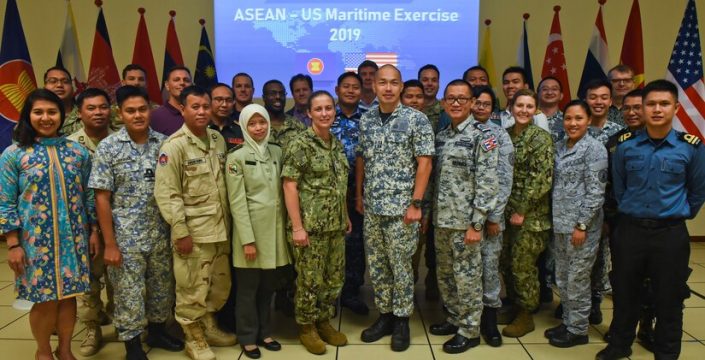ASEAN Political Security Community
Overview
To build on what has been constructed over the years in the field of political and security cooperation, the ASEAN Leaders have agreed to establish the ASEAN Political-Security Community (APSC). The APSC shall aim to ensure that countries in the region live at peace with one another and with the world in a just, democratic and harmonious environment.
The members of the Community pledge to rely exclusively on peaceful processes in the settlement of intra-regional differences and regard their security as fundamentally linked to one another and bound by geographic location, common vision and objectives. It has the following components: political development; shaping and sharing of norms; conflict prevention; conflict resolution; post-conflict peace building; and implementing mechanisms.
The APSC Blueprint envisages ASEAN to be a rules-based Community of shared values and norms; a cohesive, peaceful, stable and resilient region with shared responsibility for comprehensive security; as well as a dynamic and outward-looking region in an increasingly integrated and interdependent world.
The APSC Blueprint is guided by the ASEAN Charter and the principles and purposes contained therein. It provides a roadmap and timetable to establish the APSC by 2015. It also leaves room for flexibility to continue programmes/activities beyond 2015 in order to retain its significance and have an enduring quality.
The APSC Blueprint was adopted by the ASEAN Leaders at the 14th ASEAN Summit on 1 March 2009 in Cha-am/Hua Hin, Thailand.
Related Links
Rules-Based, People-Oriented, People-Centred
A rules-based, people-oriented, people-centred community bound by fundamental principles, shared values and norms, in which our peoples enjoy human rights, fundamental freedoms and social justice, embrace the values of tolerance and moderation, and share a strong sense of togetherness, common identity and destiny;
Legal Matters
The ASEAN Senior Law Officials Meeting (ASLOM) was established in 1985 and held its first Meeting on 26 – 28 September 1985 in Jakarta, Indonesia. ASLOM reports its work to the ASEAN Law Ministers’ Meeting (ALAWMM) which was established in 1986 and held its first meeting on 11 – 12 April 1986 in Bali, Indonesia.
Treaty on Mutual Legal Assistance in Criminal Matters
The work towards a Treaty on Mutual Legal Assistance in Criminal Matters (MLAT) was initially explored by Malaysia at the 8th ASLOM held on 15 – 16 June 2002 in Bangkok, Thailand. The proposal aimed to support and strengthen ASEAN Member States’ effort and capacity to combat transnational crimes and other transnational challenges by enhancing cooperation in law enforcement and mutual legal assistance in criminal matters.
Human Rights
ASEAN Member States share a common interest in and commitment to the promotion and protection of human rights and fundamental freedoms. In accordance with the ASEAN Charter, respect for and promotion of human rights underspin regional cooperation among ASEAN Member States on human rights and its cooperation with relevant national, regional and international institutions and organisations.

Women, Peace and Security
Women’s voices and leadership are key to sustaining peace, stability and development in the region. ASEAN is committed to advancing women, peace and security (WPS) as a regional priority agenda. The WPS agenda in ASEAN is guided by the commitments to implement the United Nations Security Council Resolution 1325 (2000) and other related resolutions on women, peace and security. Other key reference instruments are the Beijing Platform for Action, the Convention on the Elimination of All Forms of Discrimination against Women, and ASEAN policy statements and plans of action on the promotion of the women, peace and security agenda as well as the protection of women’s rights.
Peaceful, Secure and Stable region
A resilient community in a peaceful, secure and stable region, with enhanced capacity to respond effectively and in a timely manner to challenges for the common good of ASEAN, in accordance with the principle of comprehensive security;

Non‐traditional security issues ‐ Enhance ASEAN capacity to address non‐traditional security issues effectively and in a timely manner:

Resolve differences and disputes by peaceful means, in accordance with the ASEAN Charter and principles of international law, including refraining from the threat or use of force as well as adopting peaceful dispute settlement mechanisms while strengthening confidence building measures, promoting preventive diplomacy activities and conflict resolution initiatives:

Nuclear Weapons Free ‐ Preserve Southeast Asia as a region free from nuclear weapons and other weapons of mass destruction, while contributing to global efforts on disarmament, non‐proliferation and peaceful uses of nuclear energy:

Maritime & Related Issues ‐ Enhance maritime security and promote maritime cooperation in ASEAN region and beyond, through the strengthening of ASEAN‐led mechanisms and the adoption of internationally accepted maritime conventions and principles:
Outward‐Looking Community
An outward-looking community that deepens cooperation with our external parties, upholds and strengthens ASEAN centrality in the evolving regional architecture, and plays a responsible and constructive role globally based on an ASEAN common platform on international issues;





